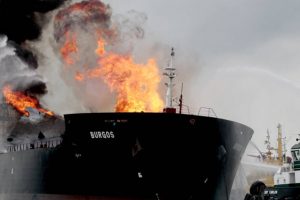Tanker Fire Fighting
 The Tanker Fire Fighting course provides essential knowledge of fire battling onboard of oil, chemical and liquefied gas tankers. The program meets the requirements of STCW Tables A-V/1-1-1 and A-V/1-2-1 and describes fire types and installed firefighting systems. During the training delegates also develop practical tanker fire fighting skills.
The Tanker Fire Fighting course provides essential knowledge of fire battling onboard of oil, chemical and liquefied gas tankers. The program meets the requirements of STCW Tables A-V/1-1-1 and A-V/1-2-1 and describes fire types and installed firefighting systems. During the training delegates also develop practical tanker fire fighting skills.
Objective:
By the end of the course, delegates will be able to cope with fire on board of the tanker vessel by applying the following learning outcomes:
• Students will define appropriate tanker fire fighting procedures and their place in a fire fighting team;
• Recognize hazards associated with transportation of liquid flammable and toxic cargoes;
• Describe ways to mitigate risks;
• Delegates will be able to identify initial sources of ignition;
• Describe correct agents to cope with fire caused by oil, chemical or liquefied gas substances;
• Be able to use fixed fire fighting deck equipment including dry powder and foam;
• Within a fire fighting team use deck dry powder installation and foam monitor correctly;
• Use portable firefighting equipment professionally.
Course content:
• Tanker cargos and related hazards;
• Tanker fire fighting procedures and response;
• Indentifying sources of ignition;
• Firefighting agents;
• Deck equipment;
• Portable firefighting equipment;
• Spill containment in tanker fire fighting operations.
Target Audience: Officers and ratings employed on tanker vessels.
Pre-requisites: Valid Fire Prevention and Fire Fighting (FPFF) certificate or Basic Safety Training (BST) certificate.
Duration: 0,5 – 1 day.
Note: This training is a pre-requisite requirement for the Basic Training for Oil and Chemical Tanker Cargo Operations Training in the UK and some Commonwealth countries.
